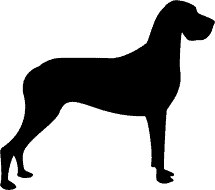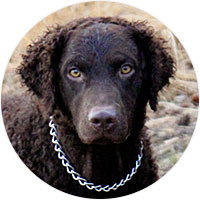Curly-Coated Retriever
Published: Last updated: by Kyle J. LarsonAverage size and lifespan

Weight: 65-100lbs
Lifespan: 9 - 12 Years
Behavior
- Affection
- Kid-Friendly
- Stranger-Friendly
- Dog-Friendly
- Barking Amount
Care
- Grooming Difficulty
- Shedding Amount
- Easy to Train
- Can Be Alone
- Exercise Need
Environment
- Cold Tolerance
- Heat Tolerance
- Apartment-Friendly
Curly-Coated Retriever Information

This breed is great for families who enjoy the outdoors and like to stay active. If the Curly-Coated Retriever doesn’t get adequate exercise, he starts to get bored and can turn to destructive behavior.
All dogs have their own personality and unique training, causing them to differ slightly from these breed stats. However, please let us know if we made an error in the stats, we appreciate your help!
Breed FAQs
Can Curly-Coated Retrievers be apartment dogs?
Curly-Coated Retrievers aren't ideal for apartments, but might be able to live there successfully if there are enough opportunities to find larger spaces nearby to play.
Can Curly-Coated Retrievers be left alone?
While Curly-Coated Retrievers prefer to be around their owners, they can do fairly well when left alone if necessary.
Are Curly-Coated Retrievers good with kids?
Curly-Coated Retrievers are typically excellent with kids. As with any dog it's important to monitor them around children, however they are often very gentle.
Are Curly-Coated Retrievers friendly with strangers?
Curly-Coated Retrievers tend to be uncomfortable with strangers. They will require extra training effort to socialize them with those outside their family.
Do Curly-Coated Retrievers get along with other dogs?
Although Curly-Coated Retrievers will mostly get along with other dogs, they may have some issues. They can typically be dealt with by socializing them with other dogs.
Do Curly-Coated Retrievers bark a lot?
As far as dogs go, Curly-Coated Retrievers bark an average amount. You can expect them to bark to alert you, get your attention, or when there are strangers or other dogs.
Do Curly-Coated Retrievers shed a lot?
The Curly-Coated Retriever isn't a heavy shedder. Some limited brushing and occassional cleaning should help prevent much hair build-up.
Do Curly-Coated Retrievers need a lot of grooming?
With a Curly-Coated Retriever you won't need to dedicate any extra time to special grooming. Their coats are easy to deal with.
Do Curly-Coated Retrievers need a lot of exercise?
The Curly-Coated Retriever has a good amount of energy and will need to be exercised with some walks and play to keep them happy.
Are Curly-Coated Retrievers easy to train?
Most Curly-Coated Retrievers are stubborn and will take extra work to train. They can still learn trained behaviors, but will take more effort.
Can Curly-Coated Retrievers handle cold weather?
Curly-Coated Retrievers do well in cold weather. You may need to protect their paws, but they'll do well in colder climates.
Can Curly-Coated Retrievers handle hot weather?
Curly-Coated Retrievers do well in hot climates and can stay out longer without overheating.
 Getting a New Dog?
Getting a New Dog?